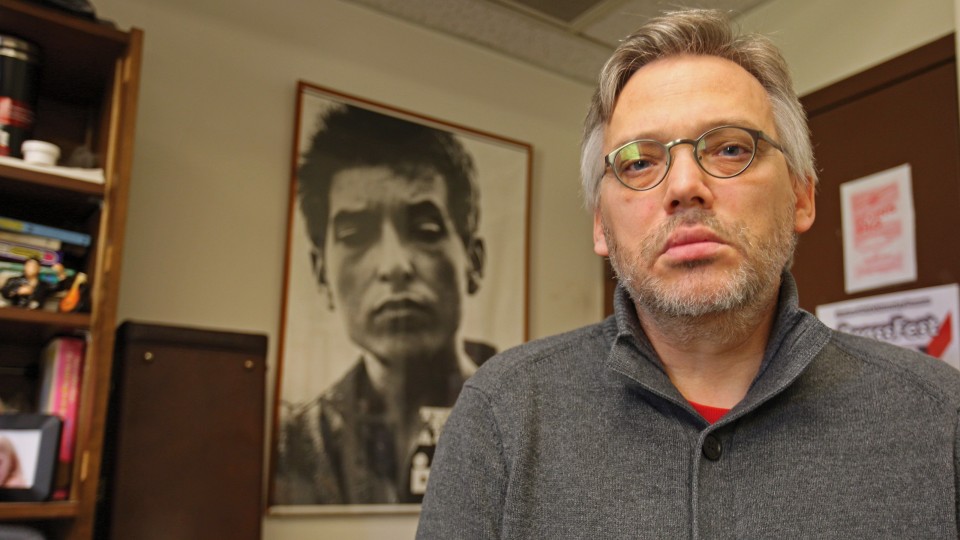
Eighteen words.
That's all it took to put Scott Anderson onto a path to becoming a Bobsessive.
In spring 1987, Anderson was putting the finishing touches on a master's degree at Northwestern University and decided to use a few extra dollars to buy a turntable, amp and "really nice set" of speakers. The first album he played on that stereo was a newly purchased copy of Bob Dylan's Greatest Hits.
While admittedly not the most popular album among the Bobsessive — a term Dylan fans used to describe themselves — Anderson selected it for the song "Positively 4th Street." It was also proved an important personal choice as lyrics from "Subterranean Homesick Blues" resonated as Anderson contemplated his future.
*Twenty years of schoolin' and they put you on the day shift
Join the army, if you fail*
"I was a musician finishing a master’s degree. I knew my next job was in retail and that I would be joining the military," Anderson said. "With all that in front of me, those lyrics drew me into Dylan and never let go."
While Dylan himself often denies it, there is power behind his lyrics. His prolific work has influenced generations of songwriters and provided a bottomless source of analysis for academics, critics and fans.
Dylan's work has been so influential that it earned him the Nobel Prize in Literature, which was announced Oct. 13. This is the first time the award has gone to a musician and Dylan is the first American to win the honor since Toni Morrison in 1993.
The award announcement from the Swedish Academy credited Dylan, “for having created new poetic expressions within the great American song tradition.”
“This is a tremendous accomplishment for Dylan and popular music,” Anderson said. “Rock and Roll is really only about 60 years old. It’s young and has been considered to be a low art form.
“The fact that Dylan has been able to elevate this to a level where the Nobel committee considers it high art is amazing. This award has knocked down a big barrier for musicians and it’s going to be interesting to watch how this is perceived within the world of literature in the next year or so.”
Anderson said Dylan has been a contender for the honor for a number of years. While widely praised, the Nobel announcement has drawn some criticism as members of the literature community do not consider Dylan's work to be poetic. And, while Anderson said it's easy to understand why the merits of the award, Dylan himself would agree with the critics.
"Dylan has said over and over that he is not a poet," Anderson said. "Many academics, including Christopher Ricks of Boston University, have made the case that Dylan's lyrics are poetry, that they do follow a structure that is indeed poetic.
"While he disagrees, ultimately Dylan is not going to fight that battle because he really doesn't care. Dylan says it's up to the audience to take his music for what it is, and that those decisions are out of his hands."
Deciphering the meaning and meter of Dylan's lyrics are part of an honors special topics course offered this semester and led by Anderson, Hixson-Lied Professor of Trombone at the University of Nebraska–Lincoln.
Working with the Nebraska honors program, Anderson developed the course to allow students to focus on the careers of key musicians. Luminaries of rock and roll featured in previous semesters include Dylan, The Beatles, Paul Simon, Pink Floyd and Bruce Springsteen.
The fall 2016 course marks the second time Anderson has focused on Dylan.
"Dylan is the only artist to be featured twice in the course," Anderson said. "We split the semester into two areas. Dylan's career to date is the focus of the first part, then we get into his classic albums."
The class meets once a week. The first 15 minutes of each session are spent discussing a specific Dylan song and breaking down its lyrics.
"It's always a great dialogue with the students," Anderson said. "It's amazing to sit down with them, listen to their interpretations and realize the differences that exist between several decades of age.
"Quite often, the perspectives they bring to the table knock me out."
To Anderson, that's the magic of music and lyrics.
"I like to use Nick Hornby's line from 'High Fidelity' about how songs are a puzzle," Anderson said. "When we find a song we really like, the challenge is to listen to it over and over, thinking about it until we solve the puzzle, moving on to the next one.
“For me, the primary reason I like Dylan’s music so much, is because they are complex, almost endless puzzles. I can listen to them over and over again and find new meaning in the lyrics each time.”
--Troy Fedderson, University Communications